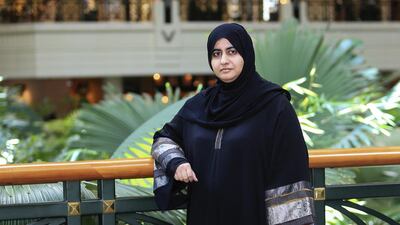SHARJAH // As a physician, Dr Sheikha Al Owais has, of course, a passion for health and social affairs – and in 2011, after years of work in these fields, she felt the time was right to step up her efforts.
The appointed member for Sharjah, a UAE University MBBS graduate, is in her first term as a member of the Federal National Council, a job she undertook out of a desire to do something for her country.
“I wanted to contribute to developing my country by relaying suggestions and the voice of the people, as well as my opinion and expertise, on my country’s cases directly to the decision makers, which is something my position as an FNC members allows me to do,” she says.
Dr Al Owais says that although being active in political matters for years, trying to reach high-ranking officials in her field was a little difficult. Now, however, as an FNC member she has the opportunity to reach out to leadership directly.
“As an FNC member, you are reaching the highest leadership and reaching out to the decision makers who can actually make a difference,” she says, adding that she wants to contribute to bettering society from a position where she knows she will be heard.
Dr Al Owais says that since the FNC elections in 2011, she has been willing to raise with the council any issue the people alert her to.
“It does not matter [what the issue is], whether it’s about the youth, retirees, children, women, or medicine,” she says.
Yet the issues closest to her heart remain health, education, women and the disabled.
“The law now says that a woman can get her retirement after 20 years [of service] and once she’s reached the age of 50. However, some women work for 20 years but don’t reach the age of 50,” she says.
“We are striving to study all sides of decreasing the retirement age for women to 15 years depending on their personal circumstances, or at least not have their retirement age matter as long as they have worked for 20 years.”
Dr Al Owais says that she also works closely with people who want to see more services for the disabled.
“The official way to reach me would be via my FNC email address, which is available on the FNC website. I personally respond to those e-mails,” Dr Al Owais says. “Also, a lot of people approach me when we have meetings or are doing our visits to discuss certain issues or concerns.
“Sometimes, friends of friends are able to directly contact me. I don’t believe I am difficult to reach.”
Dr Al Owais, whose term ends next year, says it is a great honour to serve in the FNC and she would like others to have the opportunity to take part in the council.
“I think next year I will give others the opportunity to take part in bettering the country,” she says.
“It isn’t all easy, because there is a lot of work involved. When there is an issue, the relevant committee convenes and studies the issue and its effect on society from all sides and then comes up with suggestions for the government to take the right decision.”
She says she has learnt a great deal about parliamentary work and diplomacy.
“It is not simply words. If there is an idea, it needs to be researched and studied,” she says. “On a personal level, I have learnt to carefully study and check what is asked of me before making a decision or taking a stand.
“I have a closer relationship with the people, and a closer relationship with the leadership.”
Dr Al Owais also says that her experience has taught her that people of the UAE are blessed.
“The leadership puts great effort into improving their country, and we are grateful for these efforts. This is a blessing,” she says, adding she has no doubt the FNC will further develop over the years.
“We were given an introduction when we first joined the FNC, but I wish there was a little more training in learning the official protocols and how to properly propose questions – we learnt a lot through trial and error,” she says.
“The FNC is still very young, just like the UAE, and yet the country has achieved so much in this short period of time. The leadership has good and greater intentions.”
dmoukhallati@thenational.ae

